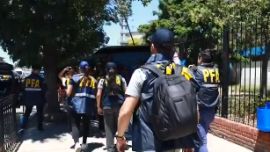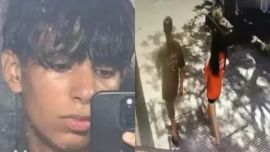Neither Javier Milei’s national government nor the Valdés brothers of Corrientes has a single reliable and unified record of the cases of 1,777 disappeared children and teenagers being searched for by court and police authorities and their families.
In that context, no-one can assert that the disappearances are due to human-trafficking for exploitation purposes. Accidents could have also taken place, as well as kidnapping by relatives or other hypotheses, many of which are currently multiplied daily in the complicated and mysterious case of the disappearance of Loan Danilo Peña.
While citizens in Corrientes are outraged over the poor actions of Governor Gustavo Valdés and his officials in charge of security and justice, who appointed a police chief – Walter Maciel, who has been charged with a cover-up of the suspected kidnapping of Loan – with a criminal record and reports of sexual abuse, Corrientes’ chief prosecutor César Sotelo declares that the province “is not a grooming area.”
However, investigators say – speaking on condition of anonymity – that the national coastline and Corrientes, in particular, has become a paradise for sex tourism in recent years. Many who travel to the territory do so using the excuse of an interest in fishing or motor racing.
Governor Gustavo Adolfo Valdés (UCR) and his brother, Juan Pablo Valdés, the mayor of Ituzaingó who is getting ready to replace him in “Ferré’s chair” (named after the popular Corrientes governor from the 19th century, Manuel Antonio Ferré) know the issue very well from information provided by confidential reports and warnings from international organisations.
Despite the implementation of a new provincial Criminal Procedure Code, crimes of all kinds are rising. Budgetary items to make court proceedings more efficient are scant and often end up benefitting criminals, who go in and out of jails in an effect known as “the revolving door.”
Unsafe
Corrientes is one of the unsafest provinces. In addition, there are now rumours of a boom in sex tourism, which is usually linked to sports fishing or hunting tours conducted in several towns of Corrientes, or are covered by religious trips, such as a few processions organised to venerate gaucho Gauchito Gil that in fact hid a prostitution ring.
“Fishermen and hunters coming from abroad or bordering countries who come to Corrientes are usually synonymous with sexual exploitation. On occasion, there is talk of abuse of minors,” explained one police investigator, speaking anonymously.
Limited nationwide surveys (in Corrientes they have not been compiled so far into a register of their own) indicate that Buenos Aires City, Buenos Aires Province and Corrientes top the podium of regions affected by trafficking in 2022, covering 63 percent of the country’s total.
It’s a situation which has drawn the attention of the United States, which through a 2022 document pointed out that “Argentine adults and children are sexually exploited and also exploited for labour in other countries.”
Exploitation for labour purposes seems to happen every day in the Argentine countryside. One of the most striking statements was made by one of Loan’s brothers himself, José, who voiced his grief over the disappearance of his brother. At one point, in an interview, he said that he needed “the return of my little brother, I really need him.”
During his daily routine “he played football, rode a bicycle, watered the orchard,” said José. “We really need him.” During discussion of Loan, there was no mention of the young child’s education.
‘Worrying’
Washington’s document pointed out that in 2010, the United Nations had urged Argentina to improve its processes to combat human-trafficking, expressing its concern over the “scant coordination of activities to combat human-trafficking at a national and provincial level.” It also warned of children being trafficked for labour and sexual exploitation purposes.
Ever since, Argentina has taken action to face these risks. The US State Department now considers the country to be at ‘Level One,’ which means that “it fully complies with the minimum standards to eliminate trafficking” and meets a wide range of requirements.
However, it should be noted that “official complicity remains worrying,” according to Washington, which criticised Argentina for allocating a specific budget for measures against trafficking.
The Loan case now brings the focus back to Argentina and Corrientes. All its decent citizens call for political action. Some too remember the names of three children – Carlos González; Natalia Soledad Falcón and Miguel Ángel Bejarano – who previously went missing and were never found.
At the time of their disappearance, the minors were all aged between two and nine years old (Loan is five). All went missing over a five-year spell, between 1993 and 1998. The father of one of them, Carlos González, given the lack of response in Corrientes’ court and police, faced a personal investigation.
A desperate father at the time was given no answer. The situation is similar to the one being experienced by Loan’s relatives and older brothers who – despite the large demonstrations calling for assistance to find a child who disappeared during democracy – have never been received by any of Gustavo Valdés’ officials.
related news
by Antonio D'Eramo, Noticias Argentinas



















Comments